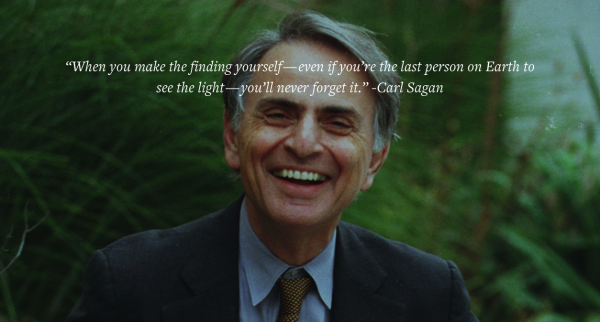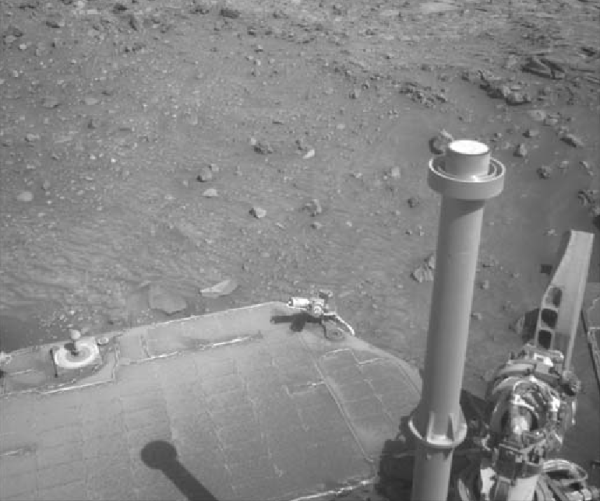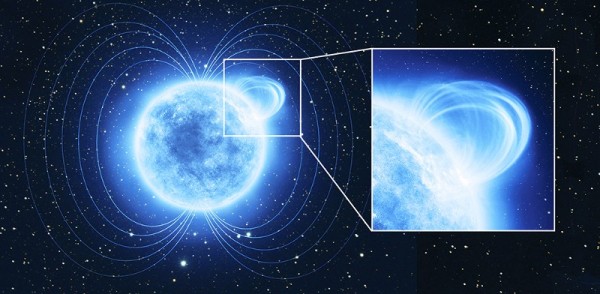"Growth is never by mere chance; it is the result of forces working together." -James Cash Penney
We don't normally have a week like this, where we not only take on the biggest topics in all of existence, but also have a ground-shaking announcement to make that alters the very fabric of Starts With A Bang! This past week, we've had a whole slew of outstanding things that we've covered, including:
- Do science and religion have to be at odds? (for Ask Ethan),
- A Jedi's dream come true (for our Weekend Diversion),
- Virgo's final galaxy, M100 (for Messier Monday),
- The Opportunity of the lifetime... on Mars!,
- How are neutron stars magnetic?,
- An atom in the Universe (for Throwback Thursday), and
- A warm welcome to our new writers!
Some great questions, answers, topics and an out-of-this-world announcement capped a tremendous seven days, and you've had your chances to weigh in here on our forum. Without further ado, here are your comments of the week!
 Image credit: Irene Nathanson of http://picturethissafari.blogspot.com/2012/11/a-typical-day-in-african-….
Image credit: Irene Nathanson of http://picturethissafari.blogspot.com/2012/11/a-typical-day-in-african-….
From Sarah Jaudon on our science/religion article: "Thank you for this- it’s so refreshing to read about science from someone who has an open mind, and I think science in general is an entity, above all others, that consists of allowing all possibilities their due consideration."
Let's be completely honest here about what we know to the best of our ability: scientifically, we can extrapolate back to before there were humans, before there was life, our Earth, our Sun, any stars or galaxies, or even matter-and-radiation in our Universe, and trace out our entire cosmic history without the necessity for anything other than the physical laws of nature. It's amazing what we know!
But that same knowledge is also limited in principle. There are a finite number of particles with a finite number of interactions that have been around for a finite amount of time, and hence the information that the Universe contains is finite. In other words, if we keep asking questions, we'll eventually run across questions that the Universe does not contain enough information to answer.
 Image credit: Rhys Taylor (edits by me), via http://astrorhysy.blogspot.com/2013/02/beginners-guide-to-universe.html.
Image credit: Rhys Taylor (edits by me), via http://astrorhysy.blogspot.com/2013/02/beginners-guide-to-universe.html.
I believe that the questions of where inflation came from and why the fundamental constants have the values they do may very well be two such questions. Where did all this come from? Beyond a certain level, I can only give you possibilities.
But that said, from SCPThree on the same topic: "Science and dogma are at odds. The rules by which each operate are diametrically opposed. One revolves around evidence, one around faith. Can they coexist peacefully? Of course that’s possible, but not ideal. Dogma, in any capacity, does a disservice to the advancement of humankind."
I think this is an important distinction to make, because although there is such a thing as religious dogma, not all religion is dogma, and not all science is free from dogma. All of our currently accepted scientific ideas were once regarded as fringe theories, and much of what was used to argue against them was based on dogma -- both religious and scientific in various incarnations -- rather than on the evidence itself.
The key to successfully understanding the world around us, to the best of my understanding, is to simultaneously be open-minded to creative, new ideas, even ones that challenge the limitations of what should be physically possible, while subjecting all those ideas to skeptical, rigorous, scientific scrutiny.
It's a challenging, delicate balance to navigate, especially for those of us who've believed something or followed one particular world-view for a long amount of time. Yet, when you make the discovery or have the realization for yourself, like Carl said, you'll never forget it! May we keep at it, all of us.
Image credit: Screenshot from Attack of the Clones, via http://jedicole.blogspot.com/2011/09/jedi-justifications-2-lightsaber.h….
From PJ on the topic of a real-life (almost) lightsaber: "In the land of Oz, we are not allowed anything laser over 1mW!!! 2 watts is unbelievable anywhere in the world, surely. How many ‘kids’ are going to be tempted to remove the rod to get the beam travelling without restriction? If a few mW’s of purple can ignite paper, needless to say what 2 watts can do to skin!!"
It might not seem like 2 Watts is a large amount of power; after all, a human being, just by being alive, produces about 75 Watts of power on average. But what makes lasers so special, in terms of energy (or power, which is energy-per-unit-time), is their very large surface energy, which translates into a large power-per-unit-area.
For example, here is a 2 Watt blue (445 nm) laser in action.
Also from PJ on our Messier Monday: "Thank you Ethan, and Judy Schmidt for the excellent render."
I should say that Judy used data from Hubble's WFC3 in red, green and blue filters, and then filled in the chip-gap with data from WFPC2 using its suite of red, green and blue observations. It's been a long time since I've given you a giant Messier Monday scroll-through of a galaxy, so I hope that you enjoy this unique slice through Judy's original image!
Cheers, you Messier Monday fans.
From Cleon Teunissen, who provided some outstanding information on the Mars Rovers' cleaning events (excerpted): "Some additional information about the cleaning events: http://en.wikipedia.org/wiki/Cleaning_event
“The term started being used in 2004 as the Mars Exploration Rovers’ solar panels started to benefit from these events.”
“Cleaning events can either be rapid, such as overnight, or over many days where solar power slowly goes up.”
[...]
The cleaning events occur at random, but they occur so often (pretty much every month) that mission control has no worries that the solar panels might get to dusty.
The power output of the solar panels affects how much the rover can travel on a given day."
I agree with all of this, except the part that "mission control has no worries that the solar panels might get too dusty," because they did. Let me take you back to 2009, when Spirit and Opportunity were both operational, but when there hadn't been a significant cleaning event in some time. Spirit was receiving only 30% of the power it was receiving on day 1, and Opportunity was down to 50%. According to NASA's Mars Exploration rover site (scroll down to April 8th, 2009):
"Opportunity also benefited from a solar array cleaning event which boosted energy levels by about 40 percent, a big increase. Now if only Spirit could get such a cleaning."
Here's the difference between a clean rover and a dirty rover.
Part of the reason Spirit died was because it didn't have enough power left to get out of where it was stuck. For those of you who want to remember Opportunity's lost twin sister:
"Located further south of the Martian equator and on the other side of Mars from Opportunity, Spirit had to park on a north-facing slope every Martian winter just to survive. Many team members believe Spirit's inability to get on such a slope during the fourth Martian winter was the reason she never phoned home after going into hibernation. Spirit's last communication was received on March 22, 2010."
Opportunity has been the overachiever by far of the two, and is currently operating at 81.8% dust-factor-efficiency, which is actually down from a recent maximum of 96.4% from mid-May. Apparently, hanging out on the rim of a massive crater is a great place for efficient cleaning events.
Some days, I still wonder what both of these rovers would have achieved had the team that wanted to install a windshield-wiper system on these rovers to clean the dust gotten their way!
From Omega Centauri on the topic of neutron star magnetic fields: "The mag fields are supposed to decay with time, if something (presumably accretion) isn’t feeding them. What is the mechanism of field loss?"
This is actually really controversial and cutting-edge, because although the theory is that these magnetic fields are supposed to decay over time -- that is what the models predict -- this hasn't been convincingly observed! However, it is conceivable that these neutron stars actually spin-down at a different rate than theory predicts, giving them the appearance of having an incorrect age. However, subsequent research disagrees with that idea.
I hate to tell you the answer is "we don't know," but right now, we don't know.
Image credit: Youngester of http://technicalstudies.youngester.com/.
From Andrea ET Barganozzi on an atom in the Universe: "[T]hank you for your post. I recommend to everybody the reading of a short story by the Italian writer and scientist Primo Levi, ‘Carbon’, if you already do not know about it.
The concept is the same of the post, but written in a wonderful Italian prose. It is considered the best example in Italy of merging of science and art in literature."
On the 70th anniversary of the Warsaw uprising, it's only fitting to encourage you to read this delightful, heartbreaking but powerful story of an atom, which finds itself in a particular place in a particular person at a particular time during World War II, and causes an indelible event to take place. [Spoiler: here's the ending.]
"It is again among us, in a glass of milk. It is inserted in a very complex, long chain, yet such that almost all of its links are acceptable to the human body. It is swallowed; and since every living structure harbors a savage distrust toward every contribution of any material of living origin, the chain is meticulously broken apart and the fragments, one by one, are accepted or rejected. One, the one that concerns us, crosses the intestinal threshold and enters the bloodstream: it migrates, knocks at the door of a nerve cell, enters, and supplants the carbon which was part of it. This cell belongs to a brain, and it is my brain, the brain of the me who is writing; and the cell in question, and within it the atom in question, is in charge of my writing, in a gigantic minuscule game which nobody has yet described. It is that which at this instant, issuing out of a labyrinthine tangle of yeses and nos, makes my hand run along a certain path on the paper, mark it with these volutes that are signs: a double snap, up and down, between two levels of energy, guides this hand of mine to impress on the paper this dot, here, this one."
Images courtesy of (clockwise, from top left) Paul Halpern, Amanda Yoho, Summer Ash, Sabine Hossenfelder, Brian Koberlein and James Bullock.
And finally, from Dan Smith on welcoming our new writers: "What an awesome set of people to join you on this blog! We’re lucky to be getting such high quality content… That being said, it’s already tough to keep up with everything you are writing right now! Adding 6 more people is going to make things even tougher to keep up with!"
That is both a compliment and a curse, but one that I'll own up to. I've been writing -- on average -- a post a day since I moved this blog over to medium, up from the four-a-week I used to do here. On top of this, my hope is that each of these new, fantastic contributors will add one-a-month (to start) to Starts With A Bang.
But what I'm grappling with internally is whether I should cut my own posts down by one or two a week to try and produce longer-form, higher-quality pieces, what I should replace Messier Monday with when we finally finish all 110 objects later this year, and whether I'm ever going to find time to finish my book whose draft is due at the year's end?! Your input is valued, of course; what do you want to see from me on Starts With A Bang?
Thanks for your great comments, and I'm looking forward to a great week, month, and -- since my birthday is tomorrow as I write this -- a great new year with you all!







What should you do to replace Messier Monday? NGC Monday, of course. There might be one or two objects on the list of some interest! I've captured all 110 Messier objects with my 10 inch telescope and Canon DSLR (many need improved). I also have more than 45 NGC or IC objects -- http://quadradical.com/ngc.php Many of these are worthy of your attention.
Agree with Rick. You have made a great start with M, so no need to stop there. Education is an ongoing process.
HAPPY BIRTHDAY Ethan.
Thanks for the birthday photo slice. At least we won't get heartburn from it.